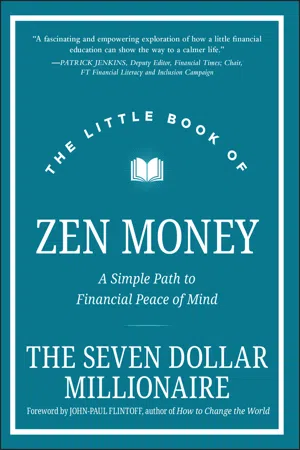The Playground
When you walk onto a trading floor, your brain may not recognise it as being the playground of your youth, but the emotions swirling in your gut will. There are no swings or chalk‐marks on the floor, but the other threatening elements are there. People. Competitive people. Competitive people with minimal rules or supervision.
Cliques and gangs, bullies and the bullied, but all now occupying desks crammed with flashing screens, using language you don't understand, using it as code to keep themselves in and you out. Your stomach tightens an inch or two just imagining it on your way into work, wishing you were back on the two‐week holiday that you paid for with the other 50 weeks of work.
But even if you never work on a trading floor – and wisely don't want to – the world of finance and investing brings that anxiety‐inducing atmosphere to you, wherever you are.
The guy talking, no shouting, about investments on TV knows no doubt. He is always right, he says, if not in words, then in his posture. Another man who is also always right in his own head disagrees with him. As if this weren't enough noise, letters failing to form words are followed by numbers to two decimal places, and they march right‐to‐left across the bottom of your screen. It is supposed to make the boring seem exciting, so you watch more, but it only makes the unknown more nerve‐wracking. There's no escaping the tension.
You seek answers and perhaps a little solace online – as though that has ever worked – but because the playground posturing can't be physically seen, it happens in words instead. In ALL CAPS. Perhaps every tweet or post by a “fin‐bro” could be summarised: “Everyone not doing what I'm doing is stupid!”
And of course, you're not doing what he's doing. So you feel stupid. And stressed.
There are so many things to do. So many things to know. It feels as though it would be impossible to know them all, and that the noise would distract you from even some of them. Who can tell you where to start?
“It's ok,” says the reassuringly upper class and well‐dressed man, who represents a renowned global financial institution. “I can take care of all of that for you,” before presenting you with a stack of documents you need to read and sign, confirming that you have fully read and understood them, for which you would need the law degree you don't have.
“Of course he can take care of all of it for you,” says your friend who knows about everything. “He's going to earn massive fees off you, directing you into products he makes more from than you do. You should do it all yourself.”
You have come right back to the beginning, and the strands of stress have tangled into a knot in your stomach so fully formed it has a voice, and it says to you: “maybe I could just forget about this.”
The Fairytale Trove
You step into the spangly warmth of the department store and are immediately welcomed by the lady who looks like your trendy unmarried aunt, who always had the latest clothes and best life.
Everything here sparkles, like a fairytale treasure trove. The cosmetics counters glow, the skincare displays gleam. You aren't supposed to know this, but it is because the lights have been set just so, bright mini‐spots hidden out of view that make everything look as though it is on stage, on TV, on screen. Not real life. Better than real life.
Of course, we may already have seen these images in advertising sandwiched between, above, below or around the other content we want, featuring our favourite celebrity who wears the thing sold right there that makes her appear so perfect and so certain. Unlike our lives, the only ones we experience from inside, feeling all the doubts and problems.
Everything here is designed to make you want it. Everything you see, hear, smell, touch, and even taste, including the free samples in the food department, is designed to pull at the senses that connect directly to your emotions to make you feel it will make your life better. And yes, feel, not think, because this is all about emotions not cognitive thought.
“Designed” is the word too. None of this is left to chance. Psychologists have worked on every aspect of how we spend money to get more of it from us at every opportunity. If making a profit this year means making your emotions false promises, then so be it.
We all know from repeated experience that none of the things for sale in this shop will make our lives better for any extended period of time. If they did, and our lives are already better as a result, we wouldn't be back here, at this crack‐den of consumption.
The buzz we get from...
